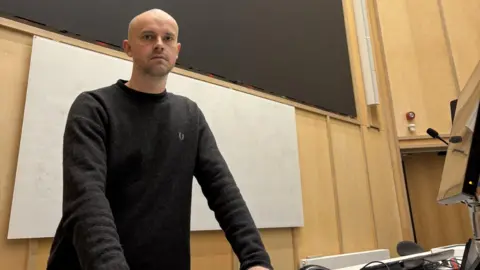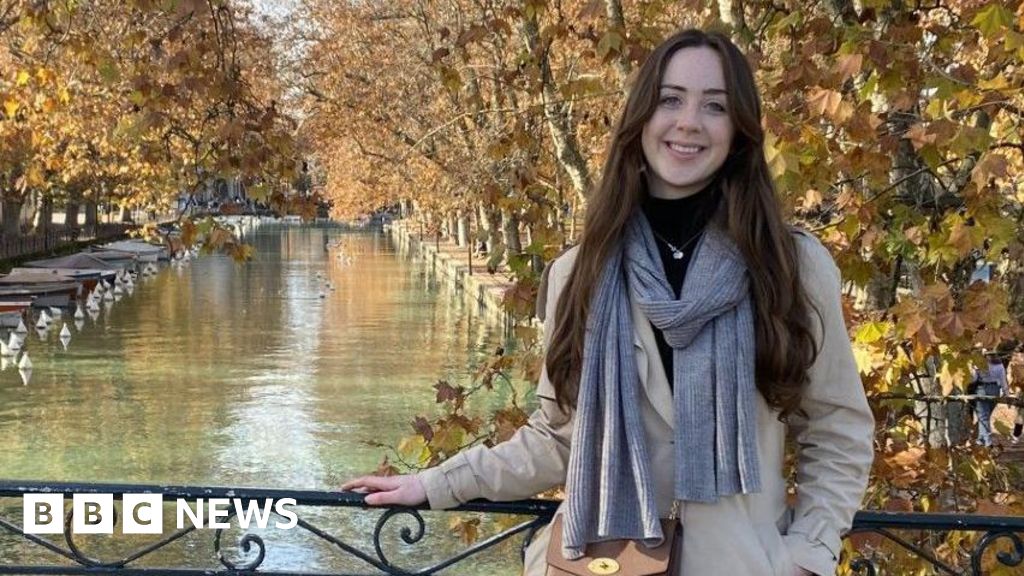Education reporter
 Darcie James
Darcie JamesUniversities across the UK are struggling with their finances.
From job cuts to course closures, many are now having to make tough decisions.
Most universities will still be facing financial struggles next year, even with tuition fees in England and Wales rising from £9,250 to £9,535, after years of stagnation.
Before that, fees had only increased by £250 since 2012, when they tripled to £9,000.
Costs, including staff salaries and building works, have continued to rise in that time – meaning budgets have been getting tighter and tighter.
And the issues are not just limited to England and Wales. Queen’s University Belfast has faced criticism this week over its decision to open a campus in India while planning to cut up to 270 jobs.
The government says it is “committed to fixing the foundations of higher education”, while Universities UK, which represents 141 universities, says the sector has been “doing more with less for years”.
‘Anger and uncertainty’
 Andy Williams
Andy WilliamsFor Cardiff University final-year languages student Darcie James, 23, the headlines hit close to home after her university last month announced plans to cut 400 jobs and close some courses.
Her faculty, which she says “feels like a little family”, is now at risk of closure. Nursing and music courses are also under threat.
The University and College Union (UCU) branch says it will have a no-confidence vote in the leadership team at the university over the plans.
Branch president Joey Whitfield, senior lecturer in Hispanic studies, says there is “a lot of anger and uncertainty”, and that some students have reported staff crying to them during lectures.
The university’s vice-chancellor, Prof Wendy Larner, says the university’s final plans “will be shaped by our community” in a 90-day consultation.
“The scale of the challenge will remain, but the way that we address it will certainly be refined and developed over the next 90 days,” she says.
Student Darcie says she was “really shocked” by the announcements, and that, as someone who has lived with anxiety, her course – in particular her year abroad in France and Spain – has “made her as a person”.
She says it is “so important others have that available too”.
‘It feels like you’re running into a wall’
 Huba Papp
Huba PappIn January, the University of Kent said more jobs would be cut in a bid to save nearly £20m.
Last February, the university announced proposals to cut 58 jobs and “phase out” six subjects – art history, anthropology, health and social care, music and audio technology, journalism, and philosophy and religious studies – in response to its “financial challenges”.
Third-year journalism student Brendan Papp, 21, is being “taught out” – meaning students currently on the cancelled course are seeing it through until completion.
When he applied, he says the course ranked in the top five in the country. Now, he says, it’s fallen to “dead last”.
An international student from Virginia in the US, Brendan came to the UK to chase his dream of becoming a sports reporter. Now, he’s keen to complete his course so he can move to Madrid to do sports management instead.
He says the class lost “two really good teachers because of the cuts”.
Now he says “it feels like you’re running into a wall” and, with engagement in the course dipping, he’s struggling to see the results from his hard work.
Brendan says the staff have been “excellent”, though, trying to provide an experience that’s “as good as possible”.
One staff member from a different department, who asked not to be named, says they believe the previous cuts have had a knock-on effect on student recruitment, leading to further cost-saving measures and damaging staff morale.
A university spokesperson says that sentiment is not reflected in its staff surveys.
They say “sector finances are under severe pressure and, like many other institutions, we have been making wide-ranging changes” in order to “reflect what students and government are looking for from universities”.
‘Everything is taking a hit’
 Nathan Wyatt
Nathan WyattStaff at the University of East Anglia (UEA) have announced plans to strike this week over the university’s proposed cuts to 170 full-time positions.
UEA says those “incredibly challenging decisions” – made in an effort to save £11m – were not taken lightly.
Nathan Wyatt, 23, the student union’s welfare officer and a former politics student, says he led the charge against previous cuts in 2023.
He says there is a feeling of “fatigue” about facing more cuts.
“The consensus on campus is that people are feeling drained, and they don’t have the energy to go out and say ‘no cuts’ as loudly as they did before.”
 Nadine Zubair
Nadine ZubairNadine Zubair, a digital humanities manager and co-chair of the university’s UCU branch, says students and staff are affected by the cuts “in every aspect of their experience here: their morale, their workloads – everything is taking a hit”.
“We are a world-leading sector, but the world is watching us crumble under our own managerial panic or desperation.”
A university spokesperson says UEA is still committed to “high-quality student education and experience, and we will work hard to limit any impact on students”.
They say “compulsory redundancies will always be a last resort”.
‘It’s making me reconsider a Masters’
 Luca Hughes Joshi
Luca Hughes JoshiDurham University says it wants to save £10m in staff costs by cutting about 200 professional services roles this year.
Further savings could include cuts to academic staff next year, it says.
Professional services staff support the running of the university, while academics are responsible for research and teaching.
“Strenuous efforts” will be made to ensure these are voluntary redundancies, says Durham, adding that it “remains a world-leading university”.
Student Lily Gershon, 22, co-editor-in-chief of the student newspaper, says the cuts are making her reconsider whether she wants to go on to do a postgraduate course at Durham.
She says the professional services staff who are facing cuts this year make up the “backbone” of the university.
Lily, from Hong Kong, says her mum “sacrifices” to pay for her to go to university as she is not entitled to a student loan and lives on about £50 per week.
But she says being the cohort whose exams were cancelled due to Covid means “we’re quite a resilient bunch, so we know we can adapt”.
 Dr Katie Muth
Dr Katie MuthKatie Muth, assistant professor in digital humanities and modern literature – and a member of Durham’s UCU Committee – says colleagues are “pretty worried across the board” by the university’s announcements.
She says “there’s a lot of anxiety” and colleagues are concerned about their workloads increasing as people leave.
“People are already working at or above capacity,” she says.
She believes “band-aid” solutions are not going to fix a higher education sector in need of systemic changes.
A university spokesperson says all departments are being asked to find savings, and the university is engaging with staff “in an open and transparent way”.
They say any voluntary staff departure “would be considered in relation to the likely workload impact and opportunities to reduce workload”.
How did we get here?
After the freeze on fees, universities say finances have been getting tighter for years.
Then there was the shock of new visa restrictions on international postgraduates coming to the UK bringing their partners and children.
International students pay higher fees, but the introduction of those restrictions in January 2024 has led to a drop of around 16% in applications.
That, in turn, has led to more competition between universities to secure places for UK students.
The body which regulates higher education, the Office for Students (OfS), has warned that without change on a scale not seen before, 72% of universities could slide into financial deficit – where a university spends more than it is bringing in – by 2026.
“We have called for universities and colleges to take bold, transformative steps to address the challenges, and we know that many are taking action already,” an OfS spokesperson said.
It is also nearly impossible to tell if a university will go bust.
That is because universities borrow money from banks based on the value of the assets they own, like buildings and land. If they get into financial trouble, they will renegotiate the terms of their loan with the bank – and no bank wants to see a university which owes them money failing financially.
The Department for Education says the government inherited a “dire economic situation” and has taken “tough decisions to bolster universities’ financial sustainability”.
“The Office for Students is rightly refocusing its efforts on monitoring financial sustainability, to help create a secure future for our world-leading sector,” a spokesperson said.
“Whilst institutions are autonomous, we are committed to fixing the foundations of higher education to deliver change for students.”
Additional reporting by education editor Branwen Jeffreys

















Leave a Reply